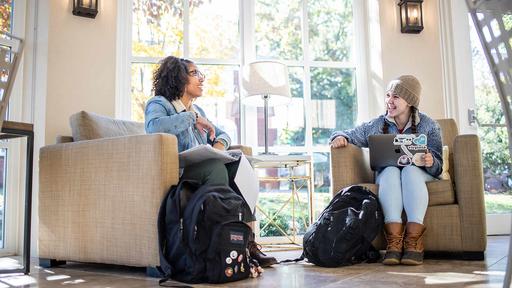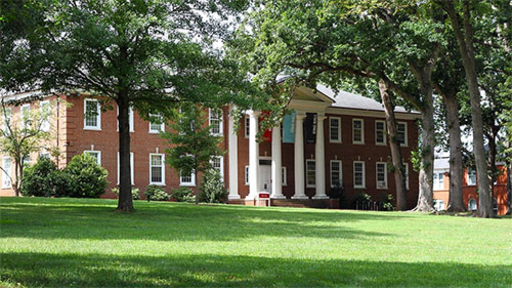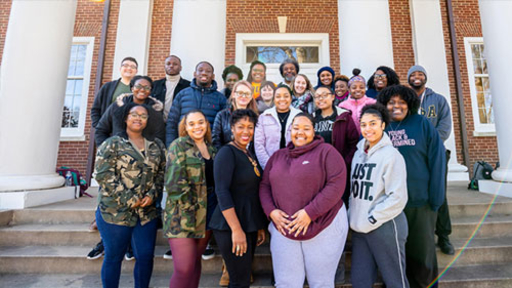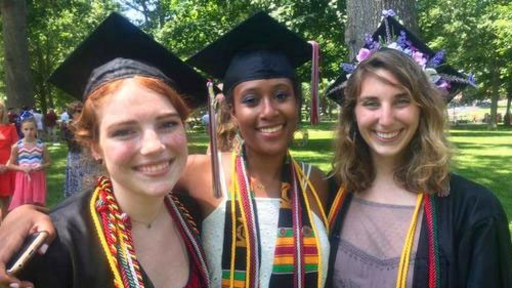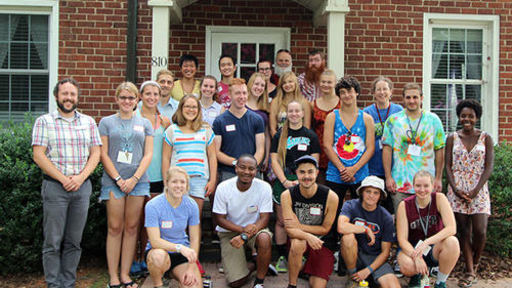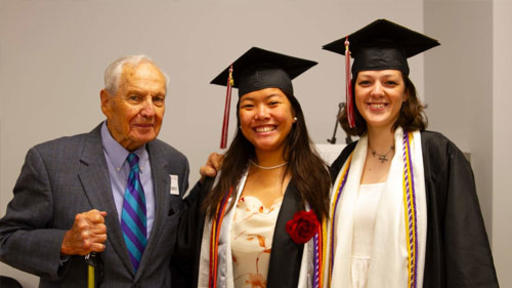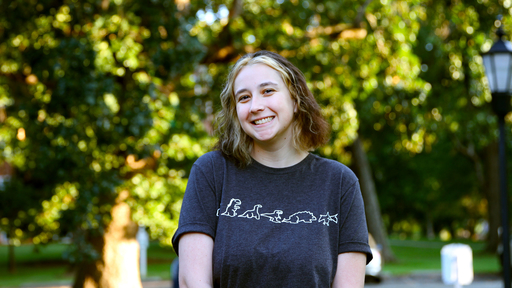Scholarships and Grants
Lowering Your Costs
Guilford College merit scholarships are awarded to incoming first-year and transfer students.
Consideration is based upon a holistic review of each student’s application for admission. We look at it all — grades, coursework, SAT and/or ACT scores or your writing portfolio (Guilford is test-optional), class rank when available, leadership and community service, and extracurricular activities.
All Guilford College scholarships and grants require full-time enrollment and that you maintain good academic standing to retain your institutional aid. Most institutional aid is restricted from paying more than 100 percent of tuition when combined with certain non-Guilford awards. Students are eligible for Guilford financial aid for a total of 8 semesters.
Students who receive other funding resources such as Tuition Remission, Veteran’s Benefits, or full tuition scholarships will see their Merit Scholarships cancelled or reduced depending on the funds received.
These scholarships are supported by the donations of a number of individuals who believe in the Core Values of Guilford College and want to invest in the success of every one of our students.
Guilford College Merit Scholarships
The Nathan Hunt Scholarship is named after a principal founder of the New Garden Boarding School, now known as Guilford College. A man committed to social justice, his was a prominent voice in opposition to the institution of slavery in America. When many were giving up on the South, Nathan stayed in North Carolina, keeping the doors of Guilford College open when a school like ours may not have been the most popular and, because of him, Guilford College remains the only Quaker-founded founded college in the Southeast. As a minister, Nathan was a leader in the Quaker community.
When considering students for the Nathan Hunt Scholarship, we are looking for those who demonstrate the highest level of academic achievement while embodying the qualities that made Nathan one of the pillars of his community: creativity, integrity, perseverance, and fortitude!
The J. Floyd “Pete” Moore Scholarship is named after Pete Moore, a 1940 graduate of Guilford College and an organizer extraordinaire. As a member of the Guilford community, it was his desire to make a Guilford College education available to all who wanted it. He was one of our 20th-century champions for wide-ranging diversity on campus. Never shy about bringing people together for the purpose of progressive conversations, he served as the coordinator of the Friends World Committee for Consultation Gathering at Guilford in 1967.
Students receiving this scholarship demonstrate an ability to connect their interest in world issues with their academic pursuits with excellence. We hope each of them finds an opportunity to connect with people who are different from them while pursuing their studies — and find personal growth in the process.
A Guilford faculty member from 1958 to 1979, Eugene Thompson had a passion for languages. He taught French, first-year Latin and a course in the universal language of Esperanto. He believed that if you want to have an impact on the lives of students, you must have proximity to them. Students remember him as a constant presence on campus, even after retirement, where he could be found in the library reading, doing research or simply spending time with Guilfordians.
Students receiving this scholarship demonstrate a strong ability and a distinct passion for connecting with others to find success. While interested in pursuing any number of majors while students here, these scholars also understand the importance of being great writers and speakers when you set out to be a world changer in your chosen field.
Clara Cox, Class of 1902, was a community activist from High Point, N.C., known for her dedication to fighting racism. She was particularly active in the Association of Southern Women for the Prevention of Lynching, and to honor her efforts to promote social and civic justice, a low-income housing project in High Point was named after her. She also served as minister of Springfield Meeting until her death in 1940.
Harriet Peck was a Quaker abolitionist and teacher from Rhode Island who served on the first faculty of New Garden Boarding School (1837-39). She actively spoke out against slavery, promoted free produce movement (goods from vendors who did not use slaves), distributed anti-slavery literature, and illegally taught local African Americans on Sundays. Learn more about her through her letters, available in Hege Library’s Friends Historical Collection.
Nereus and Oriana Mendenhall were students in the early years of New Garden Boarding School (now Guilford College). Nereus, born in Jamestown, N.C., was an educator, doctor, and legislator. He returned to the school to serve as the principal teacher for a number of years, most notably from 1860 to 1867, when the couple chose to remain in North Carolina during the U.S. Civil War to continue the school’s operation.
Nereus and Oriana had five daughters and raised them with a commitment to education. Nereus led the coeducational boarding school by offering advanced coursework in the same classroom for both men and women. Their daughter, Mary Mendenhall Hobbs, continued her family’s educational connections as an advocate for women’s access to higher education. (May Hobbs Residence Hall is named in her honor.) She was also the wife of Guilford’s first president, Lewis Lyndon Hobbs.
T. Gilbert Pearson, Class of 1897, is considered a founding father of the U.S. conservation movement because of his leadership in the 1905 founding of the National Audubon Society. Raised as a Quaker in central Florida, he arrived at Guilford needing to improve his writing skills but with a rich knowledge of birds. He offered his collection of bird eggs and specimens as initial payment to Guilford College, which President Lewis Lyndon Hobbs accepted. After graduating from Guilford in 1897, he completed graduate work at the University of North Carolina at Chapel Hill. He returned to Guilford to found the Biology Department, and later served on the faculty at the State Normal School (now the University of North Carolina at Greensboro).
Grants and Additional Aid Opportunities
Students who complete and send in the FAFSA are eligible for consideration to receive Guilford College need-based aid in the form of a Guilford College Grant. In making these awards, we look at the student aid index (SAI) relative to the cost of attendance at Guilford. In many cases, the Office of Student Financial Services will replace the need- based funding with a named endowment. Students must be registered for at least 12 credit hours (full-time) and remain in good academic standing. Guilford grant amounts can vary from year to year depending on the level of financial need demonstrated from year to year.
NOTE: If you receive a scholarship from any source after being awarded the Guilford Grant, the grant may be reduced by the amount of the scholarship that was added to your award package. This can occur before, during or at the conclusion of any semester and will be adjusted at the time the Office of Student Financial Services is notified of this additional scholarship.
Students from Guilford County, N.C., are eligible to apply for the Guilford College Shift_ed Scholarship Program (previously known as Say Yes) online at https://shift-ed.org/shift-ed-scholarship-2/
New Student Eligibility
- Graduate from a Guilford County Schools High School
- Have been continuously enrolled in Guilford County Schools since 9th grade
- Complete the Free Application for Federal Student Aid (FAFSA) each year
- Complete the shift_ed scholarship application and indicate their post-secondary institution enrollment by July 1 st
- Maintain full-time enrollment (12+ credit hours) and be in good academic standing with a GPA of at least 2.0 at a post-secondary institution
Tuition awards for Partner North Carolina 4-Year Private Institutions
- Graduates with a family AGI less than $75,000 are eligible for full tuition awards paid by shift_ed partner institutions
- Graduates with a family AGI $75,001-150,000 may be eligible for a tuition award up to $3,000/year
Federally funded grant to students pursuing their first bachelor’s degree who have high financial need as determined by the FAFSA. For the 2026-2027 academic year, the Pell Grant maximum award is $7,395.
Additional information regarding Pell Grants is available at https://studentaid.gov/understand-aid/types/grants/pell.
North Carolina residents who attend Guilford College may be eligible to receive the North Carolina Need Based Scholarship (NCNBS). To be considered, students must file the FAFSA and have met the following criteria
- Student Aid Index (SAI) from the FAFSA of $15,000 or less
- Be a North Carolina resident as well as a North Carolina resident student for tuition purposes, as defined by North Carolina Residency Manual
- Be enrolled as an undergraduate student in at least 6 credit hours at a qualifying private North Carolina campus
- Not have a previous bachelor’s degree
- Demonstrate a certain level of financial need based on the Student Aid Index (SAI) from the Free Application for Federal Student Aid (FAFSA) of $15,000 or less
- Meet requirements for the Federal Pell Grant (except the SAI range used for Federal Pell Grant awards)
- Be Title IV eligible
For full consideration, you must complete your residency form at https://ncresidency.cfnc.org/residencyInfo/home within 30 days of the start of the semester.


